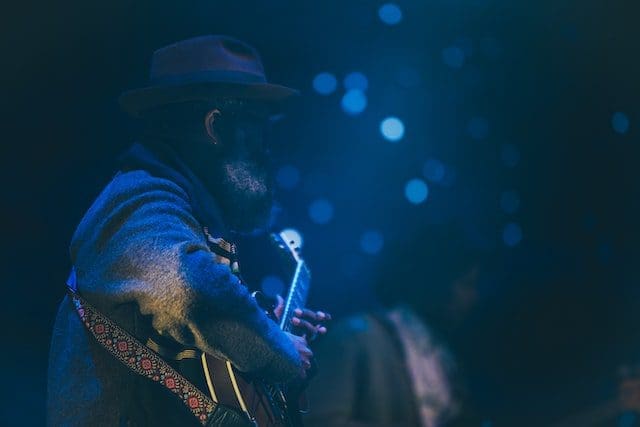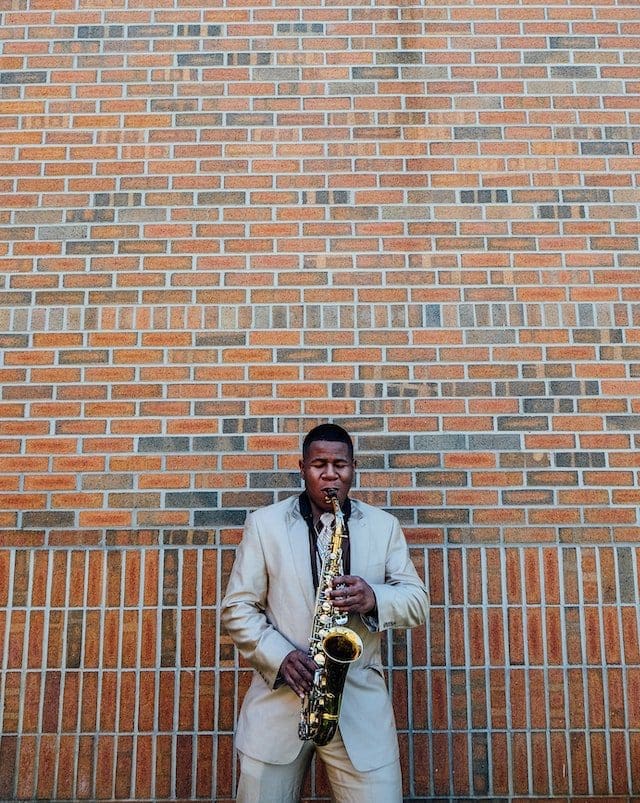Blues music is definitely a type of music that can evoke high levels of emotion in my opinion. Let us take you back to the 1860s, to where it all began, all the way up to today, where blues still lives on. Exceptionally talented blues musicians carry on their craft and keep performing for the audiences around the globe who crave a little bit of the blues. Who are top 10 best blues musicians or even those who are included in the 100 best blues musicians of all time? Well we are here to tell you. We want to give you the rich history of this genre of music and what the blues music of today looks like.
What Is Blues Music?
Since its origin in the deep south – Mississippi to be exact – in the 1860s, blues incorporated spirituals, work songs, field hollers, shouts, chants, and rhymed simple narrative ballads.
The main features of blues include: specific chord progressions, a walking bass, call and response, dissonant harmonies, syncopation, melisma and flattened ‘blue’ notes. Blues is known for being microtonal, using pitches between the semitones defined by a piano keyboard.
The standard 12-bar blues progression has three chords in it – the 1 chord, the 4 chord, and then the 5 chord. In the key of E blues, the 1 chord is an E, the 4 chord is an A, and the 5 chord is a B.
Why is it called the blues you ask? Well it has famously been associated with feeling blue, and when we feel sad, however it has been synonymous with chasing those old blues away.
The Most Famous Blues Musicians
The best of all time blues musicians have made their mark in this genre and we have to mention the greats who blues musicians of today look back on for inspiration. They all make any of the 50 best blues musicians lists of all time, as they were seriously top of their game.
Ma Rainey (1886)
Gertrude “Ma” Rainey was an American blues singer and influential early blues recording artist. She was dubbed the “Mother of the Blues”, and she bridged earlier vaudeville and the authentic expression of southern blues, influencing a generation of blues singers.
Gertrude Pridgett began performing as a teenager and became known as “Ma” Rainey after her marriage to Will “Pa” Rainey in 1904. They toured with the Rabbit Foot Minstrels and later formed their own group, Rainey and Rainey, Assassinators of the Blues. Her first recording was made in 1923. In the following five years, she made over 100 recordings, including “Bo-Weevil Blues” (1923), “Moonshine Blues” (1923), “See See Rider Blues” (1925), “Ma Rainey’s Black Bottom” (1927), and “Soon This Morning” (1927). Rainey was known for her powerful vocal abilities, energetic disposition, majestic phrasing, and a “moaning” style of singing. Her qualities are present and most evident in her early recordings “Bo-Weevil Blues” and “Moonshine Blues”.
Robert Johnson (1911)
Robert Leroy Johnson (May 8, 1911 – August 16, 1938) was an American blues musician and songwriter. His landmark recordings in 1936 and 1937 display a combination of singing, guitar skills, and songwriting talent that has influenced later generations of musicians. He is now recognized as a master of the blues, particularly the Delta blues style. He was one of the best acoustic blues musicians of all time.
As a traveling performer who played mostly on street corners, in juke joints, and at Saturday night dances, Johnson had little commercial success or public recognition in his lifetime. He participated in only two recording sessions, one in San Antonio in 1936, and one in Dallas in 1937, that produced 29 distinct songs (with 13 surviving alternate takes) recorded by famed Country Music Hall of Fame producer Don Law. These songs, recorded solo in improvised studios, were the totality of his recorded output.
Howlin’ Wolf (1886)
Chester Arthur Burnett, known as Howlin’ Wolf was an American blues singer, songwriter, guitarist, and harmonica player. He is regarded as one of the most influential blues musicians of all time. Over a four-decade career, he recorded in genres such as blues, rhythm and blues, rock and roll, and psychedelic rock. He also helped bridge the gap between Delta blues and Chicago blues. With a booming voice and imposing physical presence, he is one of the best-known Chicago blues artists.
Muddy Waters (1913)
McKinley Morganfield, known professionally as Muddy Waters, was an American blues singer and musician who was an important figure in the post-war blues scene, and is often cited as the “father of modern Chicago blues”. His style of playing has been described as “raining down Delta beatitude”.
He has influenced American rock and roll music and still continues to.
Sister Rosetta Tharpe (1915)
She was an American singer, songwriter, and guitarist and became most well known in the 30s and 40s as a gospel singer. Her spiritual lyrics and electric guitar influenced early rock and roll. Her talent for playing the guitar garnered her a lot of respect at the time but her playful voice captured her audience interest. She even influenced Elvis Presley. She is best known for her songs, her songs “O Little Town of Bethlehem”, “My Journey To The Sky” and “Jericho”.
Mamie Smith (1891)
Mamie Smith, was an American vaudeville singer, dancer, pianist, and actress. As a vaudeville singer she performed in multiple styles, including jazz and blues. In 1920, she entered blues history as the first African American artist to make vocal blues recordings. Willie “The Lion” Smith (no relation) described the background of that recording in his autobiography, Music on My Mind (1964).
Her biggest hit was a selection of songs written by Perry Bradford and released through Okeh Records, including two of her biggest hits “Crazy Blues“, and “It’s Right Here For You”.
Ray Charles (1930)
Ray Charles Robinson Sr., was an American singer, songwriter, pianist, and saxophonist. He is regarded as one of the most iconic and influential singers in history, and was often referred to by contemporaries as “The Genius”. Among friends and fellow musicians he preferred being called “Brother Ray”.
His style was a combination of jazz, rhythm-and-blues, and gospel, which was widely popular.
Charles was blinded during childhood, and his singing and pianist skills were deemed that of another world and are known by many a true fan of his work.
Eric Clapton (1945)
A British singer and guitarist can definitely be added to the list of best blues musicians, as his talent is one to be reckoned with. His prolific career has brought about singles such as “Sunshine of Your Love” and “White Room” which he worked on with Cream, and he has had a stunning solo career to boot as well.
B.B. King (1925)
Dubbed the King of The Blues, His guitar skills made him stand out, but it was also his leading vocals that captivated his audience and have ensured that his music is respected amongst the values fans out there today.
Chicago was where he found his fame, and then he toured a lot, and it was even said that he played 342 shows in 1956 alone.
Bessie Smith (1894)
Nicknamed the “Empress of the Blues“, she reached the peak of her success during the Jazz Age of the 1920s and 30s as one of the era’s most popular female blues singers.
She is often regarded as one of the greatest singers of her era and was a major influence on fellow blues singers, as well as jazz vocalists She was raised by her elder sister in a life of poverty, during which she performed on street corners with her brother Clarence. Bessie Smith formed her own act around 1913 at the 81 Theatre and first recorded in 1923 after garnering a strong reputation in the South.
She is best known for her contralto voice (the lowest female vocal range), with her most notable songs being “Nobody Knows You When You’re Down and Out”, “Devil’s Gonna Git You”, and “‘Tain’t Nobody’s Bizness If I Do”.
WC Handy (1873)
William Christopher Handy was an American composer and musician who referred to himself as the Father of the Blues. Handy was one of the most influential songwriters in the United States. One of many musicians who played the distinctively American blues music, Handy did not create the blues genre but was the first to publish music in the blues form, thereby taking the blues from a regional music style (Delta blues) with a limited audience to a new level of popularity.
Handy was an educated musician who used elements of folk music in his compositions. He was scrupulous in documenting the sources of his works, which frequently combined stylistic influences from various performers.
Lightnin’ Hopkins (1912)
Samuel John “Lightnin” Hopkins was an American country blues singer, songwriter, guitarist and occasional pianist from Centerville, Texas. In 2010 Rolling Stone magazine ranked him No. 71 on its list of the 100 greatest guitarists of all time.
The musicologist Robert “Mack” McCormick opined that Hopkins is “the embodiment of the jazz-and-poetry spirit, representing its ancient form in the single creator whose words and music are one act”. He was a notable influence on Townes Van Zandt, Hank Williams, Jr., and a generation of blues musicians like Stevie Ray Vaughan, whose Grammy winning song “Rude Mood” was directly inspired by the Texan’s song “Hopkins’ Sky Hop.”
Etta James (1938)
Jamesetta Hawkins, known professionally as Etta James, was an American singer who performed in various genres, including gospel, blues, jazz, R&B, rock and roll, and soul. Starting her career in 1954, she gained fame with hits such as “The Wallflower”, “At Last”, “Tell Mama”, “Something’s Got a Hold on Me”, and “I’d Rather Go Blind”. She faced a number of personal problems, including heroin addiction, severe physical abuse, and incarceration, before making a musical comeback in the late 1980s with the album Seven Year Itch.
James’s deep and earthy voice bridged the gap between rhythm and blues and rock and roll. She won six Grammy Awards and 17 Blues Music Awards. She was inducted into the Rock and Roll Hall of Fame in 1993, the Grammy Hall of Fame in 1999, and the Blues Hall of Fame in 2001.[3] She also received a Grammy lifetime achievement award in 2003. Rolling Stone magazine ranked James number 22 on its list of the 100 Greatest Singers of All Time; she was also ranked number 62 on Rolling Stone’s list of the 100 Greatest Artists of All Time.Billboard’s 2015 list of “The 35 Greatest R&B Artists Of All Time” also included James, whose “gutsy, take-no-prisoner vocals colorfully interpreted everything from blues and R&B/soul to rock n’roll, jazz and gospel.”
The Rock and Roll Hall of Fame called hers “one of the greatest voices of her century” and says she is “forever the matriarch of blues.”
Stevie Ray Vaughan (1954)
Stephen Ray Vaughan was an American musician, best known as the guitarist and frontman of the blues rock trio Stevie Ray Vaughan and Double Trouble. Although his mainstream career spanned only seven years, he is regarded as one of the most influential musicians in the history of blues music, and one of the greatest guitarists of all time. He was influenced by Howlin’ Wolf, Jimi Hendrix & Muddy Waters to name a few, some of them are on this same list.
Difference Between Jazz & The Blues
Blues came before Jazz and it can be said that it heavily influenced what we know as Jazz music today. I would say that the difference between the two is that blues music is stricter in terms of chord progression and even though they both engineer improvisation, blues music would rely more on a soloist improvising within a set number of bars. Jazz music is more of an ensemble piece whereas in blues, the soloist is the one that leads the call-and-reponse and runs the entire song.
Blues Instruments You Should Know
These are the most common instruments used in a blues band:
- Guitar
- Drums
- Double bass
- Piano
- Saxophone
- Brass instruments
Who Are Best Blues Musicians Today
These are the best blues artists out there today in our opinion, so make sure you have a listen to their music, you won’t be disappointed.
- Kenny Wayne Shepherd
- Joe Bonamassa
- Warren Haynes
- Janiva Magness
- Tab Benoit
- Larkin Poe
- Robert Cray
- Bettye LaVette
- Joe Louis Walker
- Susan Tedeschi
Final Thoughts
Well now I think we have covered the basics of blues music in our article today as there is so much more you can learn about each individual blues musician we mentioned above. I hope you have become inspired yourself and who knows, there may be the next B.B. King or Bessie Smith reading this very article. What a thought!
Are You A Musician Or Artist?
Develop your brand with artist development and get your music heard in TV and film with sync licensing and collaborate globally with other musicians, songwriters, and producers. Finally, amplify your music to those that need to hear it with music marketing, promotion and Spotify. Try all of this out for yourself by joining Мusic Gateway.













